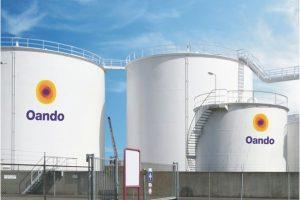
Oando Plc has announced the upsizing of its Reserve-Based Lending (RBL2) facility to $375 million, reinforcing its post-acquisition growth strategy and capitalizing on improved reserve valuations and balance sheet strength.
The deal, finalized on Wednesday, was led by the African Export-Import Bank (Afreximbank) with support from Mercuria, and extends the final maturity of the facility to January 30, 2029.
A Reserve-Based Lending (RBL) facility is a financing model common in the oil and gas sector, allowing companies to borrow based on the value of their proven reserves in Oando’s case, totaling 1.0 billion barrels of oil equivalent (Bnboe). The facility serves as a critical tool for funding the acquisition, development, and operation of hydrocarbon assets.
Oando’s RBL2 facility, initially valued at $525 million in 2019, was significantly pared down to $100 million by the end of 2024. This deleveraging progress paved the way for the recent upsizing, according to the company.
“This is a strategic milestone that reaffirms our commitment as Operator of the Oando-NEPL JV to maximizing the value of our expanded asset portfolio,” said Wale Tinubu, Group Chief Executive of Oando Plc.
“Our joint venture’s reserves have the potential to generate over $11 billion in net cash flows to Oando over the assets’ lifecycle. This working capital injection will accelerate our push toward higher production and long-term value delivery.”
Fueling Growth: From Acquisition to Execution
The capital raised will support aggressive development efforts, including accelerated drilling campaigns, infrastructure upgrades, and efficiency enhancements across the company’s operations. These moves align with Oando’s ambitious target to ramp up production to 100,000 barrels of oil per day (bopd) and 1.5 billion cubic feet of gas per day by 2029.
The development comes on the heels of Oando’s blockbuster $783 million acquisition of Nigerian Agip Oil Company (NAOC) from Italian energy giant ENI in August 2024. That deal added a substantial portfolio of upstream and midstream assets, including:
- 24 producing fields
- ~40 exploration prospects
- 1,490km pipeline network
- 12 production stations
- 3 gas processing plants
- Brass River Oil Terminal
- 960MW Kwale-Okpai Power Plants (Phases 1 & 2)
2024: A Breakout Year
Financially, 2024 marked a watershed moment for Oando. The company reported a 267% surge in profit after tax (PAT) from ₦60 billion in 2023 to ₦220 billion in 2024 driven by increased upstream output and foreign exchange gains. Revenue also jumped 44% to ₦4.1 trillion, while proven reserves nearly doubled from 505 million barrels to 983 million barrels of oil equivalent.
The company noted its $550 million crude prepayment contribution to the NNPC’s Project Gazelle, a $3.3 billion forward-sale finance initiative arranged by Afreximbank, aimed at enhancing Nigeria’s crude supply security.
Oando’s capital expenditure, however, dropped to ₦19 billion in 2024, down from ₦45 billion in 2023, reflecting a strategic focus on closing the NAOC deal. But that is expected to reverse in 2025 as the company scales up its post-acquisition development plans.
Outlook and Energy Transition Commitments
Looking ahead to 2025, Oando forecasts upstream production between 30,000–40,000 boepd, alongside trading volumes of 25–35 million barrels of crude oil and 750,000–1 million metric tonnes of refined products.
On its clean energy agenda, Oando’s electric mass transit initiative clocked over 121,000 kilometers, transporting more than 205,000 passengers and avoiding 163,500 kg of CO₂ emissions. The company also launched 50 new electric buses and secured commitments for 5,100 tons/month of PET waste, advancing its recycling plant development.
Additionally, Oando reaffirmed its commitment to ending routine gas flaring by 2027, having already achieved a 92% reduction in flaring volumes.
“2024 was a defining year for us. 2025 will be our year of execution,” Tinubu declared, pointing to a future shaped by disciplined growth, innovation, and a strong focus on delivering value to shareholders and stakeholders alike.





